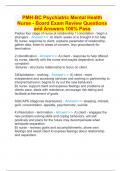PMH-BC Psychiatric Mental Health
Nurse - Board Exam Review Questions
and Answers 100% Pass
Peplau four stage of nurse pt relationship 1) orientation - begin a strangers - Answer>> A) client- seeks or is brought in for help B) nurse- response to client, explains parameter of relationship, gather data, listen to areas of concern, lays groundwork for termination
2) Identification - Answer>> A) client - response to help offered by nurse, identify with the nurse and maybe dependent, active complaint B)nurse - structures relationship to focus on client.
3)Exploitation - working - Answer>> A) client - more independent and accessing services and working in partnership to
interpret behavior; begins to try out the new behaviors. B) nurse- support client and explores feelings and problems at clients pace, deals with resistance, encourage risk-taking and facilitate achievement of goals.
SIGCAPS (diagnose depression) - Answer>> sleeping, interest,
guilt, concentration, appetite, psychomotor, suicide
4) Resolution - termination - Answer>> A) client - engages the new problem-solving skills and coping behaviors, will self positively and plans for the future may decompensate when anticipate separation B) nurse - reviews goals and accomplishments; share own feelings and assist client to express feelings about relationship and separation. Therapeutic use of self - Answer>> Use of self application of nurses own personality characteristics within the inter-action to facilitate healing
Countertransference - Answer>> Nurse response to client with feelings from own earlier conflicts. nurse must increase self-
awareness and access to assist in dealing with client more effectively
Transference - Answer>> Client experiences emotional reaction
toward nurse based on unconscious feelings that originated in past relationships. Nursing response is to confront distortion of reality gently in order to facilitate client self awareness.
Pharmacokinetics - Answer>> What the body does to drug includes absorption, distribution, metabolism, and elimination
Pharmacodynamics - Answer>> What the drug does to the body (desired effect an adverse side effects.)-Site of action (target
organ/systems) including receptors, ion channels, enzymes, and carrier proteins.
Tarasoff - Answer>> If therapist is reasonably certain that a client is going to harm someone, must breach confidentiality and inform potential victim.
Denver development screen - Answer>> A test for screening cognitive and behavioral problems in preschoolers
Seleye' stress theory - Answer>> 1)Alarm-fight or flight, sympathetic nervous system is activated 2)resistance-
parasympathetic nervous system returns many body systems to normal, body remains on red alert. 3) exhaustion- if stressor continues beyond body's capacity, organism exhaust resources and becomes susceptible to disease and death
Heroin - Answer>> CNS suppressant
GABA ( gamma Aminobutric acid) - Answer>> Regulates anxiety, calming effect. It's principal role is reducing neuronal excitability through the nervous system, responsible for Asperger-
problems with socialization and communication, repetitive behavior. ANXIOLTICS (benzodiazepine) aim to increase GABA function
Midazolam - Answer>> Sedative- controlled substance
Rohypnol - Answer>> Sedative, insomnia, pre-anesthetic, not approved in the USA
Bupropion - Answer>> Antidepressant, for smoke cesation
Memantine - Answer>> Nameda, oral medication for Alzheimer's blocks glutamate in the brain, glutamate is released in excess when brain cells are damaged by Alzheimer's disease
Bupropion - Answer>> Wellbutrin, Zyban
oculogyric crisis - Answer>> uncontrolled rolling back of the eyes
Rivastigmine - Answer>> Exelon improves the function of nerve
cells in the brain with Alzheimer's dememtia, also for PD




